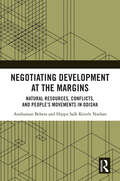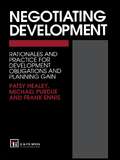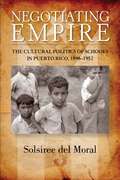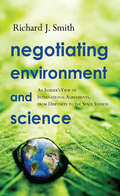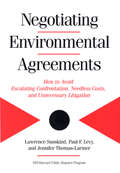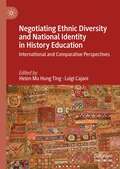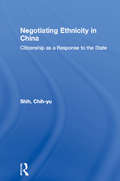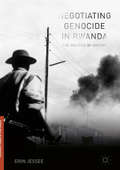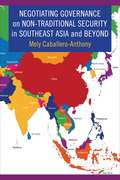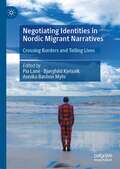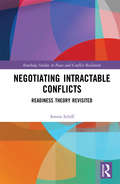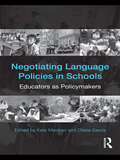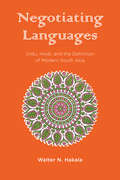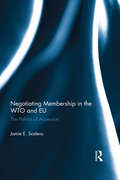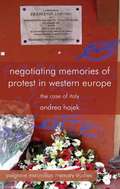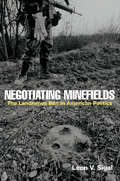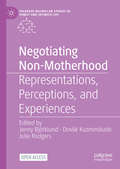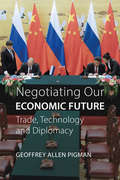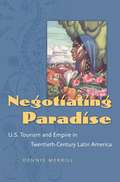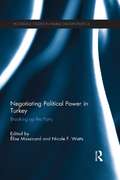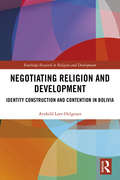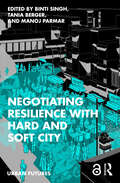- Table View
- List View
Negotiating Development at the Margins: Natural Resources, Conflicts, and People’s Movements in Odisha
by Anshuman Behera Hippu Salk NathanThis book critically examines various facets of conflicts involving people and the state arising due to the uneven distribution of natural resources. It provides an overview of the people’s movements in Odisha, a resource-rich state in eastern India. Reflecting on the conceptual frameworks of conflict, it analyses violence, and struggle for rights over resources, and public policies around natural resources, alongside local strategies and governance. Drawing from extensive field surveys in the villages of Kalahandi and undivided Koraput districts in Odisha, this volume explores the sociopolitical and economical aspects of people’s movements instead of solely viewing them as political and security threats. The authors demonstrate the misappropriations of these movements by both the state and non-state actors for their vested interests. This book offers recommendations for policymakers to draw up a more ready response to mitigate and minimize the conflict and violence and implement equitable policies around land and resources. While doing so, the book also provides some primers to development perspectives, the role of natural resources and conditions under which the natural resources can result in conflict, and principles and practices to overcome such conflicts. The volume will be an indispensable read for researchers and students of social history, social reform, tribal and indigenous studies, postcolonial studies, exclusion studies, development studies, political sociology, and South Asian studies.
Negotiating Development: Rationales and practice for development obligationsand planning gain
by Frank Ennis F. Ennis P. Healey Prof Patsy Healey M. PurduePlanning gain is the legal process by which property development is linked to social provisions. This book examines the rationale for planning gain and development obligations and reviews the practice of development negotiation through a wide range of case histories.
Negotiating Empire
by Solsiree Del MoralAfter the United States invaded Puerto Rico in 1898, the new unincorporated territory sought to define its future. Seeking to shape the next generation and generate popular support for colonial rule, U. S. officials looked to education as a key venue for promoting the benefits of Americanization. At the same time, public schools became a site where Puerto Rican teachers, parents, and students could formulate and advance their own projects for building citizenship. In Negotiating Empire, Solsiree del Moral demonstrates how these colonial intermediaries aimed for regeneration and progress through education. Rather than seeing U. S. empire in Puerto Rico during this period as a contest between two sharply polarized groups, del Moral views their interaction as a process of negotiation. Although educators and families rejected some tenets of Americanization, such as English-language instruction, they also redefined and appropriated others to their benefit to increase literacy and skills required for better occupations and social mobility. Pushing their citizenship-building vision through the schools, Puerto Ricans negotiated a different school project-one that was reformist yet radical, progressive yet traditional, colonial yet nationalist.
Negotiating Environment and Science: An Insider's View of International Agreements, from Driftnets to the Space Station
by Richard J. SmithIn this thought-provoking new book, career U.S. State Department negotiator Richard J. Smith offers readers unprecedented access to the details about some of the most complex and politically charged international agreements of the late and immediate post Cold War era. During his nine years as Principal Deputy Assistant Secretary in the Bureau of Oceans and International Environmental and Scientific Affairs, Smith led U.S. negotiations on many significant international agreements. In Negotiating Environment and Science, Smith presents first-hand, in-depth accounts of eight of the most high-profile negotiations in which he was directly involved. The negotiations Smith covers are wide-ranging and include the London agreement to amend the Montreal Protocol on Substances that Deplete the Ozone Layer, the international space station agreement, the U.S.-Soviet (eventually, U.S.-Russian) agreement on scientific cooperation, the U.S.-Canada acid rain agreement, the negotiations in Sofia, Bulgaria that established a first link between human rights and the environment, and a contentious confrontation with Japan over driftnet fishing. Smith chronicles the development of these negotiations, the challenges that emerged (as much within the U.S. delegations as with the foreign partners), and the strategies that led to substantive treaties. Smith infuses his narrative with unique historical insight as well as astute observations that can guide U.S. strategies toward productive international agreements in the future. His book also highlights the shift in diplomatic focus over the past 25 years from arms control and other security-related agreements to international and trans-boundary agreements that address global environmental threats and promote cooperative approaches in science and technology. Written for an audience with a general interest in environmental issues as well as international relations, Negotiating Environment and Science will also be an important resource for historians, political scientists, and students in international law and diplomacy.
Negotiating Environmental Agreements: How To Avoid Escalating Confrontation Needless Costs And Unnecessary Litigation
by Paul Levy Lawrence Susskind Jennifer Thomas-LarmerWhen business leaders, government officials, and other stakeholders come to the table in an environmental, health, or safety dispute, acrimony often results, leading to expensive and time-consuming litigation. Not only does this waste precious resources, but rarely does the process produce the best outcome for any of the parties involved.For the past five years, the authors of this volume have conducted semi-annual seminars at the MIT and at Harvard to provide business leaders and regulators with the knowledge and skills they need to more effectively handle environmental, health, and safety negotiations. Their strategy, known as the "mutual gains approach," is a proven method of producing fairer, more efficient, more stable, and wiser results. Negotiating Environmental Agreements provides the first comprehensive introduction to this widely practiced and highly effective approach to environmental regulation.The book begins with an overview of the mutual gains approach, introducing important concepts and ideas from negotiation theory as well as the theory and practice of mediation. The authors then offer five model negotiations from their MIT-Harvard Public Disputes seminar, followed by a series of real-world negotiated environmental agreements that illustrate the kinds of outcomes possible when the mutual gains approach is employed. A collection of writings by leading experts provide valuable insights into the process, and appendixes offer both instructions for conducting model negotiation sessions and analysis of actual game results from earlier seminars.This is the only prescriptive text available for the many regulatees and regulators involved in environmental regulatory negotiations each year. Anyone involved with environmental negotiation -- including corporate and public sector managers, students of environmental policy, environmental management, and business management -- will find the book an essential resource.
Negotiating Ethnic Diversity and National Identity in History Education: International and Comparative Perspectives
by Luigi Cajani Helen Mu Hung TingThis edited book explores the problems and challenges of negotiating the representation of ethnic minorities within history education. It investigates how states balance the (non-)acknowledgement of the reality of cultural or religious diversity, and the promotion of a point of convergence in history education to foster national identity. Shifting our attention away from the intractable challenges posed by post-conflict countries for reconciliation, the contributors draw attention to the need to explore ways to prevent or pre-empt conflicts and exclusion through history education, which could contribute to developing a more sustainable culture of peace. Drawing on a wide range of contexts and sources, this book asks how history education could contribute to forming critical, historically informed, and committed young citizens. The book will be of interest to students and academics working on themes such as nationalism, citizenship, ethnicity, history education, multicultural education, peace studies and area studies, as well as practitioners in the fields of history, social studies, civic or citizenship.
Negotiating Ethnicity in China: Citizenship as a Response to the State (Routledge Studies on China in Transition)
by Chih-yu ShihThis challenging study brings together anthropology and political science to examine how ethnic minorities are constructed by the state, and how they respond to such constructions.Disclosing endless mini negotiations between those acting in the name of the Chinese state and those carrying the images of ethnic minority, this book provides an image of the framing of ethnicity by modern state building processes. It will be of vital interest to scholars of political science, anthropology and sociology, and is essential reading to those engaged in studying Chinese society.
Negotiating Europe
by Oriane CalligaroThe book explores the various actors and forms of the promotion of Europeanness at the EU level from 1950s until the present day.
Negotiating Genocide in Rwanda
by Erin JesseeThis book is an oral history-based study of the politics of history in the aftermath of the 1994 genocide in Rwanda. Using life history and thematic interviews, the author brings the narratives of officials, survivors, returnees, perpetrators, and others whose lives have been intimately affected by genocide into conversation with scholarly studies of the Rwandan genocide, and Rwandan history more generally. In doing so, she explores the following questions: How do Rwandans use history to make sense of their experiences of genocide and related mass atrocities? And to what end? In the aftermath of such violence, how do people's interpretations of the varied forms of suffering they endured then influence their ability to envision and support a peaceful future for their nation that includes multi-ethnic cooperation?
Negotiating Governance on Non-Traditional Security in Southeast Asia and Beyond
by Mely Caballero-AnthonyThe threats the world currently faces extend beyond traditional problems such as major power competition, interstate conflict, and nuclear proliferation. Non-traditional security challenges such as climate change, migration, and natural disasters surpass states’ capacity to address them. These limitations have led to the proliferation of other actors—regional and international organizations, transnational networks, local and international nongovernmental organizations—that fill the gaps when states’ responses are lacking and provide security in places where there is none.In this book, Mely Caballero-Anthony examines how non-traditional security challenges have changed state behavior and security practices in Southeast Asia and the wider East Asia region. Referencing the wide range of transborder security threats confronting Asia today, she analyzes how non-state actors are taking on the roles of “security governors,” engaging with states, regional organizations, and institutional frameworks to address multifaceted problems. From controlling the spread of pandemics and transboundary pollution, to managing irregular migration and providing relief and assistance during humanitarian crises, Caballero-Anthony explains how and why non-state actors have become crucial across multiple levels—local, national, and regional—and how they are challenging regional norms and reshaping security governance. Combining theoretical discussions on securitization and governance with a detailed and policy-oriented analysis of important recent developments, Negotiating Governance on Non-Traditional Security in Southeast Asia and Beyond points us toward “state-plus” governance, where a multiplicity of actors form the building blocks for multilateral cooperative security processes to meet future global challenges.
Negotiating Identities in Nordic Migrant Narratives: Crossing Borders and Telling Lives
by Pia Lane Bjørghild Kjelsvik Annika Bøstein MyhrThis edited volume takes an interdisciplinary approach to the question of how identities are negotiated and a sense of belonging established in a world of increasing migration and diversity. Transcending field-specific approaches and differences in foci, the authors investigate how identity is constructed and mediated in face-to-face interactions (in real time and fictional writing), how writers use narratives to express their reorientation and their identity negotiation in a new homeland, and how material objects convey layered meaning to identity and belonging. This engagement with spoken, written and material mediation of identity resonates with recent sociolinguistic investigations on how language is connected to and intersects with embodiment, materiality and time. The volume will be of interest to students and scholars of globalisation and migration studies, sociolinguistics and narrative analysis, anthropology and cultural studies.
Negotiating Identity in the Ancient Mediterranean
by Denise DemetriouThe Mediterranean basin was a multicultural region with a great diversity of linguistic, religious, social, and ethnic groups. This dynamic social and cultural landscape encouraged extensive contact and exchange among different communities. This book seeks to explain what happened when different ethnic, social, linguistic, and religious groups, among others, came into contact with each other. What means did they employ to mediate their interactions? How did each group construct distinct identities while interacting with others? What new identities came into existence because of these contacts? Denise Demetriou brings together several strands of scholarship that have emerged recently, especially ethnic, religious, and Mediterranean studies. It reveals new aspects of identity construction in the region examining the Mediterranean as a whole and focuses not only on ethnic identity but also other types of collective identities, such as civic, linguistic, religious, and social identities.
Negotiating Intractable Conflicts: Readiness Theory Revisited (Routledge Studies in Peace and Conflict Resolution)
by Amira SchiffThrough the lens of readiness theory, this book focuses on elements that determine the success and failure in negotiating peace agreements in intractable ethno-national conflicts. Examining three cases of mediated negotiation in Aceh, Sudan, and Sri Lanka, the book provides an analytical framework for studying the processes underlying the movement toward conflict resolution. By studying readiness theory's capacity to identify the factors that influence parties’ readiness to reach an agreement, it constitutes another step in the development of readiness theory beyond the pre-negotiation stage. The work highlights the central role that third parties – mediators and the international community – play in the success or failure of peace processes, illuminating the mechanisms through which third parties affect the dynamics and outcome of the process. The systematic examination of readiness theory in these cases is instructive for researchers as well as for practitioners who seek to successfully mediate intractable conflicts and help adversaries achieve peace accords. This book will be of much interest to students of conflict resolution, peace studies, Asian politics, African politics and international relations in general.
Negotiating Language Policies in Schools: Educators as Policymakers
by Kate MenkenEducators are at the epicenter of language policy in education. This book explores how they interpret, negotiate, resist, and (re)create language policies in classrooms. Bridging the divide between policy and practice by analyzing their interconnectedness, it examines the negotiation of language education policies in schools around the world, focusing on educators’ central role in this complex and dynamic process. Each chapter shares findings from research conducted in specific school districts, schools, or classrooms around the world and then details how educators negotiate policy in these local contexts. Discussion questions are included in each chapter. A highlighted section provides practical suggestions and guiding principles for teachers who are negotiating language policies in their own schools.
Negotiating Languages: Urdu, Hindi, and the Definition of Modern South Asia (South Asia Across the Disciplines)
by Walter HakalaPrior to the nineteenth century, South Asian dictionaries, glossaries, and vocabularies reflected a hierarchical vision of nature and human society. By the turn of the twentieth century, the modern dictionary had democratized and politicized language. Compiled "scientifically" through "historical principles," the modern dictionary became a concrete symbol of a nation's arrival on the world stage. Following this phenomenon from the late seventeenth century to the present, Negotiating Languages casts lexicographers as key figures in the political realignment of South Asia under British rule and in the years after independence. Their dictionaries document how a single, mutually intelligible language evolved into two competing registers—Urdu and Hindi—and became associated with contrasting religious and nationalist goals. Each chapter in this volume focuses on a key lexicographical work and its fateful political consequences. Recovering texts by overlooked and even denigrated authors, Negotiating Languages provides insight into the forces that turned intimate speech into a potent nationalist politics, intensifying the passions that partitioned the Indian subcontinent.
Negotiating Membership in the WTO and EU: The Politics Of Accession
by Jamie E. ScaleraWith the accession of Afghanistan in 2016, the World Trade Organization (WTO) numbered 164 members with nineteen other states in line to join. The WTO is certainly not alone in its growth though; the Organization for Economic Cooperation and Development (OECD), the North Atlantic Treaty Organization (NATO), and the European Union (EU) are all expanding with dozens of states continuing to negotiate their potential membership. What impact does membership in international organizations really have? Why do some states have a seemingly easy path to joining international organizations while others find the process nearly impossible? What implications do these difficult accession processes have on the domestic and international politics of the acceding states? The author presents the two-level theory of accession, which highlights factors at the domestic level and international organization level, to explain how accession processes in the WTO and EU vary from state to state and the impact of these variations. In so doing, this book provides a unique perspective on the topic of membership in international organizations.
Negotiating Memories of Protest in Western Europe
by Andrea HajekNegotiating Memories of Protest in Western Europe explores the transmission of memories of 1970s protest movements in Italy, Germany, France and Great Britain. Focusing on Italy, it analyzes commemorative rituals, memory sites and other forms of 'memory work' performed by social groups in a city where a protester was killed by police in 1977.
Negotiating Minefields: The Landmines Ban in American Politics
by Leon V. SigalAgainst all odds, the International Campaign to Ban Landmines helped to enact a global treaty banning antipersonnel mines in 1997. For that achievement it was awarded the Nobel Peace Prize. In this volume, Leon Sigal shows how a handful of NGOs with almost no mass base got more than 100 countries to outlaw a weapon that their armies had long used. It is a story of intrigue and misperception, of clashing norms and interests, of contentious bureaucratic and domestic politics. It is also a story of effective leadership, of sustained commitment to a cause, of alliances between campaigners and government officials, of a US senator who championed the ban, and of the skilful use of the news media. Despite this monumental effort, the campaign failed to get the United States to sign the treaty. Drawing on extensive internal documents and interviews with US officials and ban campaigners, Sigal tells the story of the in-fighting inside the Clinton administration, in the Pentagon, and within the ban campaign itself that led to this major setback for an otherwise unprecedented, successful global effort. Negotiating Minefields will be of interest to students and scholars of military and strategic studies and politics and international relations.
Negotiating Non-Motherhood: Representations, Perceptions, and Experiences (Palgrave Macmillan Studies in Family and Intimate Life)
by Jenny Björklund Dovilė Kuzminskaitė Julie RodgersThis open access edited volume focuses on the representations, perceptions, and experiences of women who do not have children against the backdrop of traditional gender norms, pronatalist policies, and patriarchal structures. While involuntary and voluntary childlessness have typically been treated separately and studied within different disciplines in most previous scholarship, contributing authors explore non-motherhood beyond the involuntary/voluntary divide and consider a wide range of conceptualizations of women who do not become mothers. The editors bring together a variety of perspectives from different national contexts and disciplines, including family studies, gender studies, literary and cultural studies, sociology, and film studies to explore non-motherhood. The book focuses on how women who choose or experience non-motherhood are negotiated, felt, represented, and received.
Negotiating Our Economic Future: Trade, Technology, and Diplomacy
by Geoffrey Allen PigmanTariffs and trade barriers are rising, and major diplomatic institutions that have long promoted liberal trade are coming under attack as impending trade wars threaten global trade and global value chains. At the root of this crisis, argues Geoffrey Pigman, is accelerating technological change. Negotiating Our Economic Future traces the impact of today's major technological transformations on global trade and the diplomacy that makes trade possible. Not only is global trade changing, in terms of what is traded and how, but diplomacy in the digital age is changing as well. Arguing that we must think differently about trade and diplomacy, Pigman proposes pragmatic policy approaches for the diplomatic management of a challenging and potentially dangerous future.
Negotiating Paradise
by Dennis MerrillAccounts of U.S. empire building in Latin America typically portray politically and economically powerful North Americans descending on their southerly neighbors to engage in lopsided negotiations. Dennis Merrill's comparative history of U.S. tourism in Latin America in the twentieth century demonstrates that empire is a more textured, variable, and interactive system of inequality and resistance than commonly assumed. In his examination of interwar Mexico, early Cold War Cuba, and Puerto Rico during the Alliance for Progress, Merrill demonstrates how tourists and the international travel industry facilitated the expansion of U.S. consumer and cultural power in Latin America. He also shows the many ways in which local service workers, labor unions, business interests, and host governments vied to manage the Yankee invasion. While national leaders negotiated treaties and military occupations, visitors and hosts navigated interracial encounters in bars and brothels, confronted clashing notions of gender and sexuality at beachside resorts, and negotiated national identities. Highlighting the everyday realities of U.S. empire in ways often overlooked, Merrill's analysis provides historical context for understanding the contemporary debate over the costs and benefits of globalization.
Negotiating Peace in Deeply Divided Societies: A Set of Simulations
by Radha KumarThis first-of-its-kind book approaches peacemaking in a unique way. It makes an innovative application of simulation—as training exercises for peacemaking—and puts readers in the role of key actors during conflict and conflict resolution processes, giving them a nuanced understanding of the risk, opportunity and cost of making peace. These simulations are also aimed at helping would-be negotiators and/or mediators prepare better. The six exercises included in the book are mostly based on actual or potential negotiations in ongoing peace processes. They cover the following aspects of negotiating peace in deeply divided societies: preventing escalation of the conflict (also called conflict management), initiating Confidence Building Measures (CBMs) that pave the way for political resolution, addressing the root causes of conflict, arriving at a comprehensive agreement to end the conflict and post-conflict peace-building. As a set of exercises, the six simulations in this book will be useful for administrators, negotiators and peacekeeping forces. This book will also be an important source of information for students and academics studying Politics, International Relations and Peace Studies.
Negotiating Political Power in Turkey: Breaking up the Party (Routledge Studies in Middle Eastern Politics)
by Élise Massicard Nicole F. WattsThis edited collection looks at how political parties in Turkey actually work, inside and out. Departing from traditional macro-level analyses, the book offers a new sociological approach to the study of political parties, treating them as non-unitary entities composed of many different groups and individuals who both cooperate and compete with one another. The central proposition of the book is that parties must be studied as clusters of relationships in specific locales rather than as unitary ‘black boxes.’ This ground-up approach provides new insights into the internal workings of political parties; why parties gain and lose elections and other political resources; and the ways in which power is negotiated and exercised in Turkey and beyond. Chapters include studies of Islamic and Islamist parties from the 1970s to the present, ethnic Kurdish parties, center- and extreme right parties, and the far left, as well as independent candidates. The authors pay particular attention to relations – and the blurry boundaries-- between parties and civil society groups, religious associations, non-governmental organizations, ethnic and socio-economic groups, and state institutions, and to the variability of external and internal party politics in different geographies such as Adana, Mersin, and Diyarbakir.
Negotiating Religion and Development: Identity Construction and Contention in Bolivia (Routledge Research in Religion and Development)
by Arnhild Leer-HelgesenThis book argues that relationships between religion and development in faith-based development work are constructed through repeated processes of negotiation. Rather than being a neat and tidy relationship, faith-based development work is complex and multifaceted: an ongoing series of negotiations between theological interpretations and theories of human development; between identities as professional practitioners and as believers; between different religious traditions at local, regional and international levels; and between institutional structures and individual agency. In particular, the book draws on a deep ethnographic study of Christian faith-based development work in the Bolivian Andes. The case study highlights the importance of seeing theological interpretations as being firmly embedded in local religious and cultural systems involved in a constant process of identity construction. Overall, the book argues that religion should not be seen as homogeneous, or either 'good' or 'bad' for development; instead, we must recognise that institutional faith-based identities are constructed in many ways, formal, theological and interpersonal, and any tensions between ‘religious’ and ‘development’ goals must be worked through in an ongoing recognition of that complexity. This book will be of interest to researchers working in development studies and religious studies, as well as to practitioners and policymakers with an interest in faith-based development work.
Negotiating Resilience with Hard and Soft City (Urban Futures)
by Binti Singh, Tania Berger, and Manoj ParmarThis book explores how cities are shaped by the lived experiences of inhabitants and examines the ways they develop strategies to cope with daily and unexpected challenges. It argues that migration, livelihood, and public health challenges result from inadequacies in the hard city—urban assets, such as land, infrastructure, and housing, and asserts that these challenges and escalating vulnerabilities are best negotiated using the soft city—social capital and community networks. In so doing, the authors criticise a singular knowledge system and argue for a granular, nuanced understanding of cities—of the interrelations between people in places, everyday urbanisms, social relationships, cultural practices, and histories. The volume presents perspectives from the Global South and the Global North and engages with city-specific cases from Africa, India, and Europe for a deeper understanding of resilience. Part of the Urban Futures series, it will be of great interest to students and researchers of urban studies, urban planning, urban management, architecture, urban sociology, urban design, ecology, conservation, and urban sustainability. It will also be useful for urbanists, architects, urban sociologists, city and town planners, policy makers, and those interested in a deeper understanding of the contemporary and future city.
